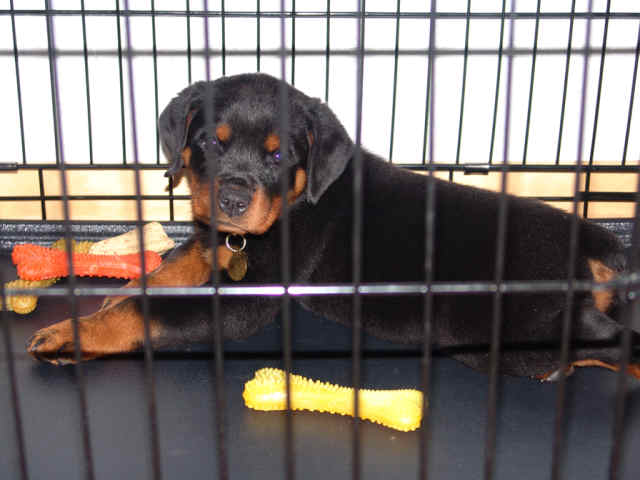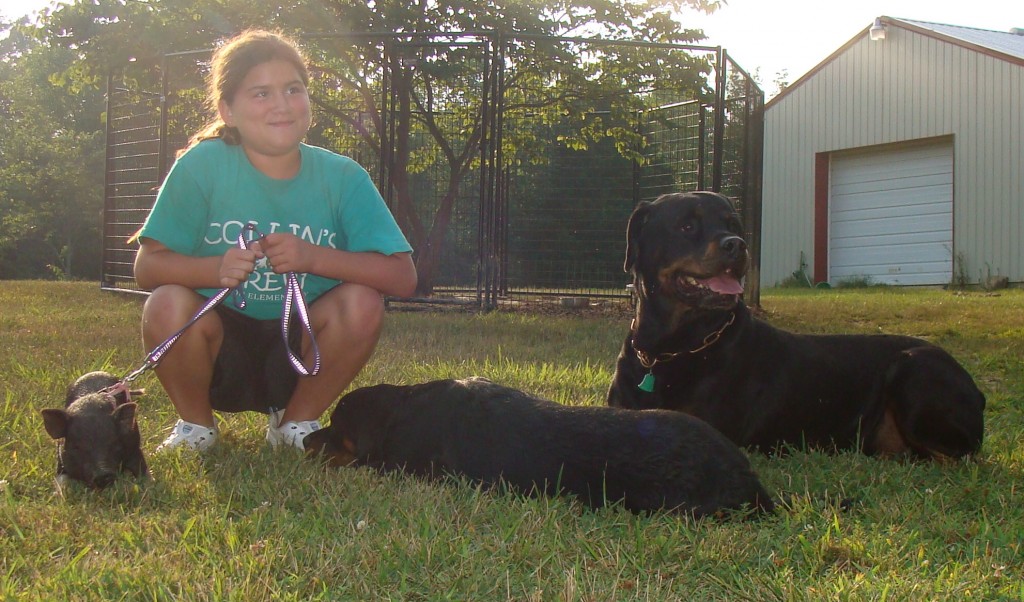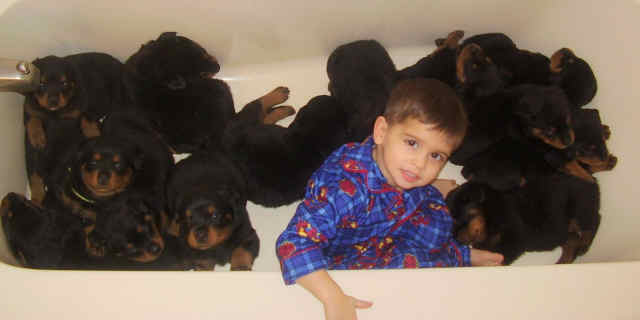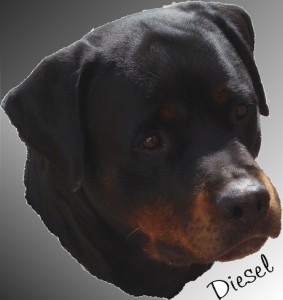Guardian Rottweilers is proud to work with some of the world’s more renowned trainers. Guardian Rottweiler training services offered include:
* basic puppy care
* on and off leash obedience
* advance show handling
* tracking, retrieve
* foundation work for Schutzhund/IPO/IGP and protection work
* socializing
We also offer specialized training for behavioral problems/behavior modification. However, it is imperative to understand that our training will involve both ends of the leash as most Rottweiler problems stem from poor communication from the owner/handler. The Rottweiler is a working breed and lives to work and loves to please. Please contact us for more information on our training services.
Guardian Rottweilers offers boarding as well as board and train. Please contact us for rates and availability.
A DOGS PLEA – ANONYMOUS
Treat me kindly, my beloved friend, for no heart in all the world is more grateful for kindness than the loving heart of me.
Do not break my spirit with a stick, for though I might lick your hand between blows, your patience and understanding will more quickly teach me the things you would have me learn.
Speak to me often, for your voice is the world’s sweetest music, as you must know by the fierce wagging of my tail when your footsteps fall upon my waiting ear.
Please take me inside when it is cold and wet, for I am a domesticated animal, no longer accustomed to bitter elements.
I ask no greater glory than the privilege of sitting at your feet beside the hearth.
Keep my pan filled with fresh water, for I cannot tell you when I suffer thirst.
Feed me clean food that I may stay well, to romp and play and do your bidding, to walk by your side, and stand ready, willing and able to protect you with my life, should your life be in danger.
And, my friend, when I am very old, and I no longer enjoy good health, hearing and sight, do not make heroic efforts to keep me going. I am not having any fun.
Please see that my trusting life is taken gently, I shall leave this earth knowing with the last breath I draw that my fate was always safest in your hands.
This is Lexis, a pup from one of our previous litters.
Photo by Haisley’s Photography.
![lexis1[1]](https://guardianRottweilers.com/wp-content/uploads/2012/02/lexis11.jpg)
Potty Training Puppy
Probably the most asked for advise is potty training for the new family member. When done correctly, it requires a lot of attention and commitment. However, it you take the time now, you will save yourself and your furry friend lots of frustration later. Before you take your new Rottie home, I have already encouraged it’s natural behavior to begin potty training here. If you follow up diligently, you will have a well trained pup in no time. Try to keep a schedule. Feeding at regular intervals will help your puppy eliminate at regular intervals as well.
CRATE TRAINING
Although many feel that crate training is cruel, it is actually very humane. Not only is it much kinder than being constantly angry at your pup for circumstances beyond his control, but in the wild, their “den” was their home and source of comfort. Many owners will tell you that long after their dog is crate trained and no longer kept locked in the crate, that if the crate remains out and unlocked, the dog will return there for napping, etc.
I am currently potty training my son. And for those of you that believe potty training a puppy to be difficult– let me just assure you that this is one of those tasks you would give a teenager to encourage abstinence! If I were to send my son outside to play and then tell him if he thinks he needs to go potty, he must run down the street, around the neighbor’s house, through the neighbor’s back yard and knock on her door; wait for her to answer and then explain to her that he needs to go potty; oh, and our neighbor doesn’t speak the same language as my son, so she would have no idea what he is saying assuming he made it there before he went potty. How many think this would be an effective form of potty training? Well, this is essentially what we ask of puppies only a few weeks old when we give them full run of a home that is massive to them.

I recommend crate training your new puppy until you have established a behavior routine that the puppy knows well. Crate training not only helps with potty training, but also many other behavior issues including chewing and separation anxiety. Any dog will naturally not want to lie in it’s own excrement. Choosing a cage or crate the appropriate size is essential. You want it to be large enough for the puppy to lie and move around in, but too small to allow it enough room to potty and still have a clean area to sleep in. You want to force your puppy to hold it to avoid having to lay in it’s own waste. This will probably mean buying a larger crate as your puppy grows or obtaining a larger one that can be effectively divided to provide a small enough space. We do not recommend the wire cages. For one, they are so open, then if a puppy does have an accident he is able to splash and spear it EVERYWHERE! Also, they may be strong enough for a puppy, but no matter how expensive, large or “strong” the box says the wire crate is, I have yet to find one that is Rottie proof! You adult Rottweiler or even larger puppy will bend and break out of the crate as though it were made out of paper. We recommend buying a smaller plastic crate now, then simply upgrading as your puppy grows. This will average about the same price as the metal one with a divider, but will actually work they way you need it too and the large plastic one will last you for many years on your adult rottie. The biggest obstacle you must overcome with a plastic crate is chewing, however bitter apple and some corrective training should help.
When you take the puppy out of the crate, the VERY FIRST thing you need to do is take it potty. Give it sufficient time as a growing puppy will usually have a bowel movement several times a day. Also take the puppy potty every time it wakes up, after he has been playing, finishes eating, or cries in the crate–this will teach him that crying is his way to let you know that he needs to go potty. Each time the puppy produces the desired outcome outside, eagerly show how pleased you are. Another tip we have found to be quite useful is to not take the puppy back inside to his crate immediately after he eliminates. Spend a few minutes playing and loving on him. You do not want him to think that as soon as he goes potty he must get put away. This may lead to a puppy that wanders around for 20 minutes, holding it and forcing you to spend time with him.
Every time you have your puppy out of the crate at home keep it under constant supervision. You may even put a leash on him and clip it to your belt loop. If he begins to sniff the floor either take him potty if it has been awhile, or distract him with a toy or play if he just came back in. DO NOT LEAVE YOUR PUPPY UNSUPERVISED OUTSIDE OF HIS CRATE UNTIL HE IS SUFFICIENTLY POTTY TRAINED AND KNOWS HIS BOUNDARIES ON CHEWING! If you know that you are going to be gone for several hours and the puppy does not yet have the ability to hold it that long, leave him in a smaller, enclosed space with plenty of newspaper. All of my puppies have been paper trained as well as begun their outside potty training (when weather permits).
HOW LONG CAN A PUPPY BE EXPECTED TO HOLD IT?
The general rule is one hour per month of puppy life (so a 3 month old puppy can hold it for up to 3 hours.) Having said that, your puppy is no different than a very young child and accidents will happen, so accept that now.
WHAT TO DO WHEN AN ACCIDENT HAPPENS?
If the accident has already occurred whether it was two minutes ago or two hours ago, the only thing you can do is clean it and realize YOUR mistake of leaving the puppy unsupervised or in too large of an area. Once the accident has occurred, it is history and if you scold your puppy, she will have no idea why you are mad. If you continue this behavior, you will end up with a nervous, scared dog that thinks your presence equals a scolding and it will end up urinating every time it sees you out of fear.
If you are fortunate enough to catch her in the act, grab the collar and firmly say “no” or clap you hands loudly. You want to startle her into stopping the act. Immediately take the puppy to the appropriate area and allow her to complete her business. Once she has, praise her like she just won a gold medal for you. With positive reinforcement such as this, it will not take your puppy long to realize what pleases you. Any dog, by nature will want to please his owner and the rottie even more so.
CLEANING UP.
Cleaning up an accident correctly is essential as puppies decide where to go by scent. They learn that the smell of the newspaper means it’s safe to go potty there as well as the outside smell. If a puppy has an accident inside and you do not clean it with a product specifically designed with enzymes to completely eliminate the mess and the odor, the puppy will smell it’s excrement on that spot and assume that this is an appropriate place to go potty. Look for products like Simple Solutions or Nature’s Miracle, that specifically say “for pet odors” as these will contain the proper enzymes to break up and eliminate all traces, as well as be safe for your rottie. Avoid products containing ammonia as these will actually attract your dog.
Rottweiler Property Laws
1. If I like it, it’s mine.
2. If it’s in my mouth, it’s mine.
3. If I can take it from you, it’s mine.
4. If I had it a little while ago, it’s mine.
5. If it’s mine, it must never appear to be yours in any way.
6. If I’m chewing something up, all the pieces are mine.
7. If it just looks like mine, it’s mine.
8. If I saw it first, it’s mine.
9. If you are playing with something and you put it down, it automatically becomes mine.
10. If it’s broken, it’s yours.
Photo by Haisley’s Photography.
![Mikaelashoe[1]](https://guardianRottweilers.com/wp-content/uploads/2012/02/Mikaelashoe1.jpg) Chewing.
Chewing.
Just like babies, puppies experience their environment through their best sensory organ–their mouth. That combined with a mouth full of sharp, painful teeth erupting and a puppy can literally chew you out of house and home.
PUPPY PROOF.
Everyone knows that before you bring a new baby home, you must first baby-proof your home to make it a safe and comfortable environment for you new little one. Puppies are no different. Anything that you do not want chewed needs to be up off the floor in the area you are allowing your puppy to explore/play. This includes: shoes, bags, books, other children’s toys, and of course anything dangerous. Keep the puppies area well stocked with toys that are acceptable for her to play with. Some choose to keep a little basket for the puppy full of toys where the puppy knows and is easily accessible, others choose to scatter the toys for easy access. Either way works just as well. When you find the puppy chewing on something inappropriate, again, you will grab the collar and sharply tell her “no.” Then remove the item and replace it with something she is permitted to play with. Also try to play and interact frequently with your new puppy using the toys that are acceptable that way she will have positive association with those toys and know that they please you.
CHEWING ON YOU.
Again, just like babies, puppies will chew on you if permitted as well. Although it may be cute when they are 8 weeks old, with a growing Rottweiler it will very quickly become anything but cute. Discourage it early on with the “no” and replace method or by simplifying showing your puppy that your playtime is over when she does this. For a dog as social and eager to please as a Rottweiler, being secluded is a for worse punishment that anything else you could do.
MANS BEST FRIEND.
Bitter Apple and similar products are around $5.00 at pet stores and will quickly become your best friend for a persistent chewer. You spray it directly onto the surface that the puppy enjoys chewing (including your hands if that is an issue.) It is non-toxic and completely harmless but it has a very distinct taste that most dogs cannot stand. (My husband tried it before using it on our youngest pup and said it really does taste like a very bitter apple–I’ll take his word for it!) The most effective way to use this product is to saturate a cotton ball with some spray. Allow your dog to smell and then pick up the cotton ball in their mouth. The taste will be inescapable as the cotton ball is saturated with the spray. Then, when the puppy smells that same smell on the wooded leg of your favorite chair, she will remember how nasty it tasted. If you skip this step, when your puppy smells it for the first time on your furniture, then bites down, it may realize that only the surface of the chair leg is yucky and that the “good stuff” is underneath.
ROUGH PLAY/ AGGRESSION
If the puppy’s play becomes too rough or even aggressive, you must stop this behavior immediately. When puppies play with each other, there is a good layer of fur a well as excess tough skin. Your puppy must realize that you do not have either. Do not permit mouthing of any kind until your puppy is old enough to discern the difference and has grown to respect you as his pack leader. Every time your puppy grabs your shirt, pants, or especially skin, he must be corrected. Just like a child will test the boundaries of parents or other authority figures, so will a puppy, so you must be consistent and prepared to reinforce the issues as much as needed. If a stern “no” or grabbing the collar proves ineffective, then you may pop the puppy on the end of his nose as you are saying “no!” UNDERSTAND THAT THIS IS MEANT TO GET THE PUPPIES ATTENTION AND BE UNCOMFORTABLE, NOT MALICIOUS OR PAINFUL. You do not want to make your puppy hand shy, or scared of you. In the wild, it would be a quick nip and bark from the mom or sibling, it would not be an mauling or beating. Just enough to show him you mean business, and distract the mind from it’s current course. We also like Cesar Milan’s sharp jab at the neck–same concept.
RESOURCE GUARDING
Most animals (people and dogs too) will at some point have something important to them that they do not want to share. (Like my box of Godiva ;)’ This is called resource guarding. A dog that does not want you to touch a favorite toy, or a puppy who growls when you try to take his food. Although natural, IT MUST NOT BE PERMITTED AT ALL. If you observe this behavior, you must correct it immediately! The longer it remains unchecked, the more protective and aggressive your puppy will become. I always start with making my adults, youth and puppies sit before I give anything to them, including food. This reinforces that I am ALLOWING them to have it, rather than I am their servant bringing it to them. From the beginning, I get them used to having my hands in their food and on them while they are eating and playing, and this usually prevents the instinct for resource guarding. However, if you do see signs, even if it is something as passive as trying to push your hand away with his head or body, you must make it clear that this is not acceptable and will not be tolerated. This behavior is much easier to control and correct now that he is a puppy than it will be when he is 100+ pounds.
Sometimes the resource they are guarding is a person, and the puppy/ dog will not want anyone near that person or usually child. While this may be cute and endearing when it is a harmless puppy, it will not be so cute when the puppy is full grown. This must also be corrected by forcing the puppy to submit to as many other people interacting with his “resource” as possible. Do not think that this will make your Rottweiler any less protective of you in the event that you really are in jeopardy. When well bred with great regard to temperament, that protective instinct is ingrained in them and automatic. Some fear over-socializing their rottie may make him less protective. I can guarantee that this is simply not true. Please see SOCIALIZATION below for more information in regards to socializing your rottie.
ACCEPTABLE TOYS.
For a growing Rottweiler with amazingly powerful chompers even at an early age, you will want to supervise even the “puppy safe” toys. Rawhide, cow bones and hooves, and pig ears can quickly be chewed down to seemingly bite-size pieces. Once the item has been rendered small enough to swallow, it must be removed and discarded. If your puppy swallows a large chuck, it could become stuck in the intestines leading to an expensive surgery or even death. One of the best toys I have found is a bit more expensive, but you really get your money’s worth. It is called Kong. There are several varieties and shapes now and it is seemingly indestructible. Diesel has had the same one for about 3 years and it only takes him days to go through one of those mammoth cow leg bones. It is made of a really strong, dense rubber and can be filled with favorite treats or kibble to keep you pup entertained while you are gone. You can buy the puppy one for about $5-$10 and a Diesel size Kong for around $10-$15. Please make sure that you start with the puppy one as it is made of a softer rubber that is not only more appealing for your puppy, but also safer and less likely to break a tooth. Another really great item for chewing are the large knotted ropes. Not only will they stand up pretty well to a Rottweiler, but they help to clean the teeth while the dog plays. Also acceptable are Nylabones, and Booda toys. Most of their products are 100% digestible if the puppy swallows too big of a chunk (unlike a rawhide which may get stuck.)
Some people like to give their dogs old shoes or rolled up socks to play with and chew on. I DO NOT RECOMMEND this. Your puppy will not be able to tell which shoe is acceptable to chew and which shoe is not; which clothing it can play with and shred and which it should not. You do not want to encourage her to eat anything that smells like her master.
Tahlia, Diesel, Isis and Barbie-Q (pot belly pig)

SOCIALIZATION.
Many people mistakenly believe that by “over-socializing” a Rottweiler, he will become complacent and not be a good protector. This is a myth and is NOT true. Under-socializing your Rottweiler can lead to fear biting. A Rottweiler is protective of his family because of his love and devotion to them. His bond will not be diluted by meeting other people any more than you would love your family any less by meeting new people. Rottweilers are not stupid, and they know the difference between a friend and foe. My boy Diesel is the king of over-socialization. He has gone with us almost everywhere since he was a pup. He is the first to try and crawl in your lap seemingly oblivious of his size and will share his prized possessions with an 8 oz. kitten. Yet I have seen that same dog go from happily wagging his butt to making a sound so ferocious that you would truly believe it to be coming from a rabid bear.
We were renting a house while waiting for our current home to be built. We needed an electrician to come and fix an issue we were having so I chained Diesel up to a telephone pole in our back yard to keep him out of the way. This was not a dog cable, as those might as well be yarn for a rottie. It was heavy boat chain. The electrician came through the back gate escorted by my husband and Diesel eagerly greeted him. He began working on the outside of the house meanwhile my husband and I began cleaning the yard. (You do a lot of this with Rottweilers!) My children were in the house playing. The electrician needed to go check the breaker box in the kitchen. As soon as that man headed into the house alone where Diesel’s kids where, the telephone pole started shaking and Diesel growled and barked so ferociously that even I hesitated before approaching him. Even though he had previously met this man and was quite eager to play with him, he was still not trusted to be alone with our children.
This is only one of many stories like it that I have from personal experience. Another example I frequently give as having being prior military, I can relate too is this: If you were right now to get deployed to a country at war, you would walk around with your gun at the ready all the time, paranoid of everything and everyone. Whereas if you had been living in that country already for awhile, you would already know that there are many other soldiers maybe even from other countries that are also trying to help you as well as many residents of that country that hate the concept of war just as much as the rest of us. You would learn that there are many “strangers” that are also good people, rather than assuming that all the “strangers” are out to get you and your loved ones. You would learn to discern friend from foe rather than mindless assuming that all are foe.
Please do not make the mistake of under-socializing your dog and contributing to the negative image already publicly held.













